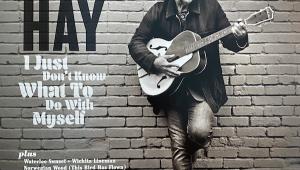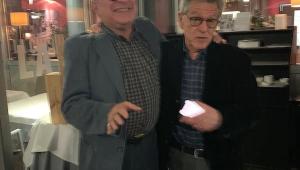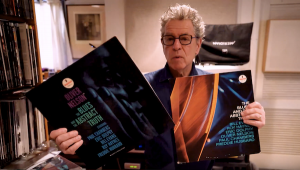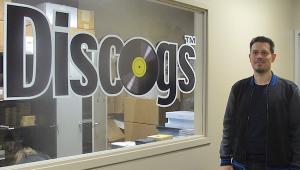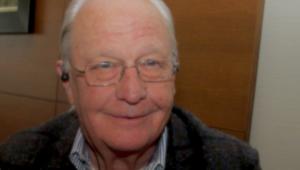Although still popular in the UK, this band has been thoroughly ignored by Americans since about 1986.
Jim Kerr of Simple Minds Gets Directly to the Heart of the Vinyl Matter
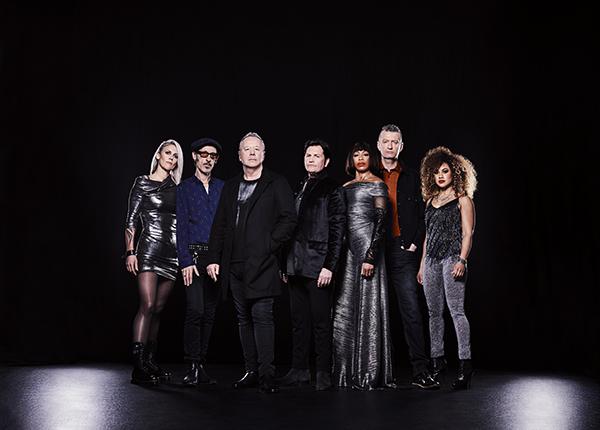
Jim Kerr, lead singer of Simple Minds, is one of us. As a kid growing up in Glasgow, Scotland in the early 1970s, collecting vinyl was of paramount importance, and he got himself a day job just so he could buy records and go see concerts. (Sound familiar?)
Fast-forward to the present day, where Kerr and his megaplatinum-selling band Simple Minds have just released their 18th studio album, Direction of the Heart, via BMG on 180g black vinyl that was manufactured in Poland. (Orange and silver LP variants are also available, for those so inclined.)
Direction marries the best sonics and songwriting intentions of the band’s high-profile 1980s recordings with modern-day sensibilities. “That’s the ideal — and it sounds like it’s an obvious ideal, but it’s never easy to do,” Kerr allows. “However, I think we’re pretty darn near it here, because the past is the past. You can’t go back. Recently, we celebrated the 40th anniversary of New Gold Dream 81-82-83-84 [which was originally released on LP in September 1982] by playing it in its entirety at the last gig of our tour [at Summer Sessions in Edinburgh, Scotland, on August 13]. So we can go back to playing that record while knowing that you can’t completely go back — but you can evoke, and you can connect that kind of feeling we had when we were 19, and 20. But it would be like trying to build the Brooklyn Bridge again now.”
That said, Kerr prefers to look ahead, artistically speaking. “It’s a different world,” he agrees. “There are different materials. There are different people. We know too much, almost — and I don’t say that in a bad way. There’s an idealism that comes into it, and I think if we can conjure up the essence of those early art-rock days — but do it with more focused songwriting that comes through experience — and then get that all together on an album, it’s not a bad combination.”
Not in the least. To delve into all that conjuring and more. Kerr, 63, and I got onto Zoom together across the Pond to discuss how important buying vinyl was (and still is) to both him and his Simple Minds songwriting partner, guitarist Charlie Burchill, why it was crucial to shape Direction of the Heart specifically as a two-sided record, and how important an influence David Bowie albums remain as part of his creative life to this day. I opened up and I was able to see / The vision thing, you got the vision thing. . .
Mike Mettler: I’ve long felt like Simple Minds have fully embraced vinyl throughout your 40-plus-year career. How important has the vinyl resurgence been to you as an artist and a listener? How do you feel about it?
Jim Kerr: Well, first of all, initially, it’s just mind-blowing. And there’s a great story you’ve probably heard — I dunno how many years ago this would be now, but Sony wanted rid of one of the main vinyl pressing plants in Holland [Haarlem, since renamed Record Industry]. And this kid [Ton Vermeulen] who was just pressing up vinyls for DJs, he took it off them for a song. They wanted rid of it, and they just gave it to him! And now, they’d move the earth to get it back! (laughs heartily) I mean, who could have foreseen that?
But embracing vinyl — t’s been an amazing thing. For me, even just the culture of it — the culture of not only the putting the needle on, but the artwork, the whole thing. Walking around with your own [vinyl] billboards, seeing who you wear. It was how you cut your cloth, what tribe you were part of, and all that culture. Thank God there are still remnants of that — and growing remnants. New remnants.

Mettler: Speaking of new vinyl, let’s get into Direction of the Heart, which runs for a nice 40ish minutes. Were you thinking of sequencing it for two sides, right from the start? What was the thought process when you guys started on it?
Kerr: It’s just inherent. I mean, that whole CD thing of 13 tracks — first off, no one’s got 13 good tracks. Forget it! It’s like, if you give me 13 tracks, my heart sinks. It’s more like, “Give me your best three.” You know? “Give me your best two sides.”
We still see it as roughly 43, 44 minutes — if you get there. I mean, I would have it at 37, 38 [minutes], but people feel like they’ve been ripped off. That’s just the same as adding to the seven days in a week. No one’s going to convince me any different. They might try and change it, but . . . (laughs)
Mettler: Well, only The Beatles are allowed eight days a week. Everybody else — probably not. Only them.
Kerr: (laughs) Okay. That’s the only one. Only they can get away with it. But that album length, it’s just inherent. There’s something about it. Listen, I even feel it in podcasts. A lot of podcasts are 42 minutes, 45 minutes. Enough’s enough.
Mettler: Yeah, you should know when to not overstay your welcome. When it came to the recording process, I know this is a bit of a lockdown record, but were you and Charlie [Burchill] able to be in the same studio together, and everybody else kind of came in remotely, so to speak? How did you guys do that?
Kerr: That was one of the real positives about it. Because we were locked down, and because there was nothing else able to go on, Charlie and I not only did get in the room together — we were the only ones in the room! It’s fortunate that we get on. Because it was just us for a lot of it. Towards the end, we augmented stuff, but for the longest part of it — the biggest part of it — it was the two of us. That’s how we started the band — it was the two of us.
There was nothing else going on — no distractions. There was a real commitment there I’d like to think is perceivable in the music. We got really, really into it. And it gave us a chance to not just go with the first thing, but to kick the tires a bit. Things would be sounding real good, and it would be like, “That’s done. That’s done.” Then we’d go back two weeks later: “That’s not done. Let’s go again.”
Again, one of the things coming out of that thing was that while the whole world ground to a halt, we found a way of at least keeping the creativity going.
Mettler: Was there any one track that you didn’t have to mess with too much, one that just kind of fell into place easily?
Kerr: The opening track, “Vision Thing,” just felt right. It just felt like, this is what the record’s all about. It really did. And from the opening chords, it’s like, “Yeah, this is where we want to be.”
Kerr: The song’s a celebration of life — essentially, my dad’s life. He passed during the record [being made]. But that’s in a real sweet spot, because we’re playing it live just now, playing at festivals. A majority of the audience don’t know it and certainly don’t know what it’s about, but they’re jumping up and down because it’s a real joyous journey. In amongst the chords, there’s an obvious sentimentality due to the subject matter. I think that’s a sweet spot between joy and sadness, between darkness and light — all that stuff. If you can get in there, it’s a good place to be.
Mettler: There is a signature feel going on with it, for sure. Another track I’d like to get more into is “Solstice Kiss,” and the way it starts out — I almost feel like it’s a not-too-distant cousin of “Belfast Child” [a linchpin track from Simple Minds’ May 1989 album, Street Fighting Years], in a way. Was that intentional? Did you want to have that connection point sonically?
Kerr: That’s bang-on, yes. That’s one of the songs written by our bass player, Ged Grimes — well, the music anyway. And Ged has this connection to Celtic music. He does a lot of music in the game world, and he worked on a couple of things recently that were using the very best Celtic musicians.
He came up with this tune, and at the start, there was this whistle thing that was very reminiscent of “Belfast Child” that we thought, when we heard it, “You know what? Elaborate on it.” So, there’s a little “Stairway to Heaven” at the start (chuckles), but then it comes in with the suitable bombast.
And by the very name “Solstice Kiss” — it’s ethereal, and you can very much feel the skies. I guess the title itself made me wanna write about that, or that kind of romance. I could feel all those pictures in the music.
Mettler: I can see that, literally. It’s a beautiful thing. As to the vocalizations on the record, I feel like there’s a lot of interesting, layered vocal choices — again, something I feel like is a hallmark of yours. When we hear another voice, whether it’s male or female — and I believe Sarah Brown is your female vocalist. . .
Kerr: (interjects) Sarah is amazing, yes!
Mettler: No pressure to obviously match your previous work because in the ’80s, you had the great voice of Robin Clark’s along with you. That helped thread the needle of the sound you wanted for this record, I think.
Kerr: Well, it’s great that you mentioned that — going back to the ’80s, and those records we did with Robin Clark. At the time, of course, Jimmy Iovine was producing that album, [October 1985’s] Once Upon a Time. I would have a loose notion of something, and he would say, “Just go for it! What is it you’re trying to do here?” I’d say, “Well, we’re trying to get this sound — I remember seeing this singer that did the Bowie thing” [i.e., Clark sang backing vocals on March 1975’s Young Americans]. Jimmy said, “Why don’t we get her, then?” “Ok, great! Could we get her?” “Yeah, we can get her!” And she would come in, and it’d be great.
[MM adds: Just cue up tracks like “Sanctify Yourself,” “All the Things She Said,” and “Alive and Kicking” to see/hear exactly what we mean!]
Kerr: We know our music can take it, having those kinds of vocals — and once you get excited about it, as we did on this record, it became a feature again, because we used it quite a lot of the tracks, these harmonies. Yeah, they were some of the happiest days for me in the studio, thinking, “God, this really improves the whole thing!” When you’ve got great talent at hand — use it.
Mettler: You re-sanctified yourself, to steal another title there.
Kerr: Yeah, you’ve got it.
Mettler: Now, if remember this correctly, I believe you told me the the last time we talked, the first album you bought as a kid actually is 50 years old this year. I think it’s named after somebody who played guitar by the name of Ziggy. . . (both chuckle) Tell me about your experiences with David Bowie [and his June 1972 album], The Rise and Fall of Ziggy Stardust and The Spiders From Mars.
Kerr: Of course! That’s when I got my first job after school — and it was far from luxurious. I was cleaning the back store of a butcher shop. I got paid five pounds, which sounds like nothing — but I was Frank Sinatra, because then, my first ever concert ticket bought was the Ziggy tour. It was a matinee, and it was 60 pence. 60 pence! (both laugh) I could bring you and your mom and your whole family to that show!
At the time, an album was 1-20 [i.e., £1.20], so I only wanted the job to buy records and tickets anyway — and that’s what I did for the next three or four years. And I got to see the Bowies and the Roxys [i.e., Roxy Music], and Lou Reed, Alice Cooper, and Genesis, with Peter Gabriel. I remember we went up there early during the day, and we saw him come up the street with a middle part on his head. It just blew our minds. And then, it was The Who, The Rolling Stones, and my favorite band at the time, Mott the Hoople, who had a then-unknown band, Queen, opening for them.
Mettler: It’s amazing you got to cut your concertgoing teeth like that. Thinking of Ziggy Stardust today, since it’s literally 50 years old this year, what is it about that album that still sticks with you? There’s a certain mystery and feel and sound to it that I feel is in your veins literally, is that right?
Kerr: Well, I think there were two records then. We first had [September 1971’s] Electric Warrior from T. Rex, and Marc Bolan. We thought he was Jesus. It turns like he was only John the Baptist — Jesus was still to come. (MM laughs) Yeah. And poor Marc got shunted to the side.
Kerr: Both of those records — essentially, what it was is, we were at the right age. No one sounded like them before. There was great music before, but The Beatles and The Stones were already my mom and dad’s music, and your big brother’s music was almost like jazz music. When Bowie came — when those records came — between the look, between the sound, between the lyrics, between the atmospheres, you know, Ziggy — okay, I’d never heard anything like [the album’s opening track] “Five Years.” Never heard anything like that. And then when you saw him on TV — never saw anything that looked like that.
And you felt like, “This is my thing. This is my time.” Your big brother didn’t like it: “No that’s hokey.” Or your mom and dad: “Who’s this?” So, it felt great. This was your own thing.
Mettler: Sure was, and still is. The cover you guys do at the very end of Direction of the Heart of The Call’s “The Walls Came Down” [originally from their 1983 album, Modern Romans] is a brilliant choice, I think. It’s a song that also has a kind of wordless chorus to it when you’re doing the “nah-nahs” — which, of course, might make people think of a No. 1 song of yours that also had some wordless elements to it [i.e., Simple Minds’ 1985 chart-topping single], “Don’t You (Forget About Me).” Is that a deliberate connection, or just kismet?
Kerr: Well, you know what — there are two things there. First, let’s go back to Bowie, and let’s go to “Starman” [another key track from Ziggy Stardust], and that little fade at the end. He wasn’t afraid to do a few “la-las,” and a few “nah-nahs.” These universal choruses — well, the great thing is, anyone in the world can sing them. It doesn’t matter which language you speak.
This is the second Call song we have covered [the other one being “Let the Day Begin,” which is on Searching for the Lost Boys, a bonus album included with the deluxe edition of May 2009’s Graffiti Soul]. And it’s only fine covering someone else’s song where I think I can hear ourselves in it. It’s almost like a loop, where we know Michael was inspired by elements of our sound, and here we’ve gone and taken what he’s made of that, and tried to do — I mean, if ever there was a song that found its time again, it’s “The Walls Came Down.” Especially when we were recording it a couple of years ago, that was all you’re thinking about: walls.
Kerr: And those lyrics — talk about someone being prescient. It’s like a song finding its time again. It’s in that sweet spot, because it’s about all those heavy subjects. But the chorus is like a frat house — like we’re going to a party in space! (both laugh)
Mettler: What comes around, goes around the walls, as they say. Well, as I say. (laughs) Okay, last thing, which in my usual big-picture question to everyone. Let’s project ourselves 50 years into the future. It’s 2072, and unless science is doing something weird, you and I are likely not on the planet physically anymore. If a listener in 2072 cues up Simple Minds to listen to, what do you hope they get out of that experience?
Kerr: Well, I hope it makes them feel something. And I hope that something is a positivity. I hope they feel something wholehearted. I hope they feel something with this music of its time. Whenever anyone says to me, “What would you like the legacy to be?” — if it were to be out in a phrase, I would say, “They punched above their weight.”

SIMPLE MINDS
DIRECTION OF THE HEART
180g 1LP (BMG)
Side One
1. Vision Thing
2. First You Jump
3. Human Traffic
4. Who Killed Truth?
Side Two
1. Solstice Kiss
2. Act Of Love
3. Natural
4. Planet Zero
5. The Walls Came Down

- Log in or register to post comments


I lost track of these guys at the same time the rest of the American market did, and they weren't really my cup of tea anyway.

They are indeed great at performing live, LITCOL is a great album.




